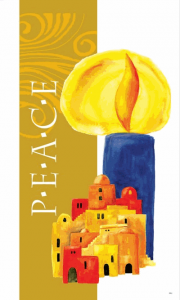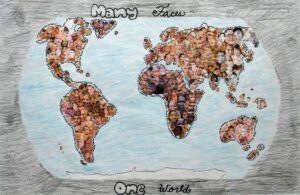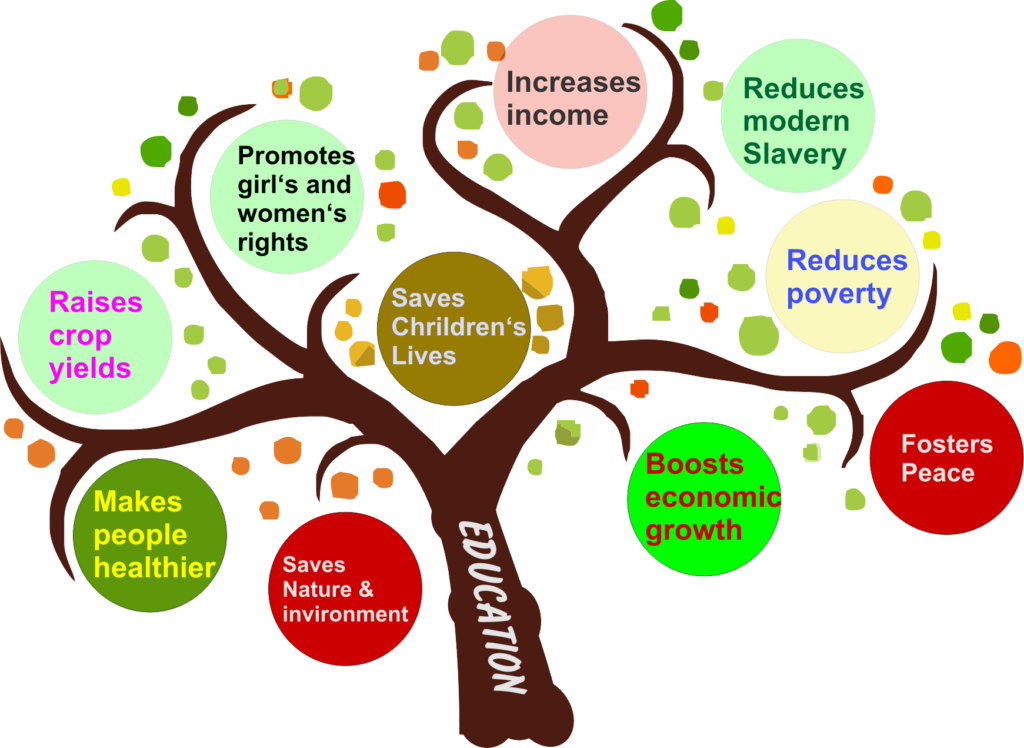
| Texto en español | Text auf Deutsch |

Thoughts to the first Sunday of Advent
Our world is full of small and large armed conflicts that cost thousands of people their lives or their physical and mental integrity. It is simply inconceivable that we humans learn nothing from our history.
In connection to this, you could consider the verse from Mat 5,39: “When someone strikes you on your right cheek, turn the other one to him as well.” A wisdom, which irritates us immediately. Why do I have to suffer the hurt twice and become humiliated to get peace? – Not a few will ask what is that good for. It is no different than a wisdom that the ancient Greeks had already recognized, namely that of amnesty. There it was prescribed by law and executed in all its consequences. What does that mean?
What has happened cannot be undone, and we all know this from often painful experiences. The call and desire for revenge, retribution, and (supposed) justice is strong. But how can one succeed in escaping this spiral of mistreatment, murder, manslaughter, and ongoing mutual violence? It is a dilemma that has plagued human history for thousands of years and we see the best example of this in the events in the Middle East. War and suffering only lead to new war and suffering.
In ancient Greece, it was recognized that a new, untouched page must be opened in the Book of Life. However, this can only happen if all the old “insulting and hurting” do not continue to burden. Therefore “general forgetting” – the amnesty, was prescribed by law. The violation or disregard of this law was made under penalty of death or synonymous exclusion from the society (outlaw = was left to fend for itself), the highest of all penalties. Thus, amnesty can be seen as a kind of prescriptive forgetting. This requires tremendous courage from people in terms of size and tolerance. This is often not easy. But only through this pain a new beginning succeed, and a new, common life possible.
The Christian faith understands itself as a religion of peace. But what a contradiction do we see and read in the daily news?
Today we celebrate the first Sunday of Advent. This should recall the entry of Jesus into Jerusalem. (Luke 21,25–28.34–36). This report on this triumphal entry is a contrast program. But these contrasts show us examples for use in one’s own life. It is the story of a king who comes as a low servant on a donkey, not in royal robes, but in clothes of the poor and the humble. Jesus Christ does not come as an earthly king to conquer by force but with love, grace, mercy, and sacrifice for his people. His kingdom on earth has no armies, riches, or splendor, but humility and servanthood. He does not conquer nations or markets; he does not want to dominate anyone. No, he invites and speaks to the hearts of the people, His message is that of peace.
Every peace always starts on a small scale, in ourselves, no matter what the external circumstances may be. Every peace begins or ends where the boundaries between me and my neighbor are crossed. If there is disunity within ourselves, it usually reflects outward in our words and actions. Sooner or later, this inner “war” leads to external strife. That’s why it’s so important to be at peace with yourself, “to function smoothly”. I cannot ask for something from others that I am not prepared to give from myself.
The essential step to inner peace is forgiveness. Only by forgiving others and oneself can the negative emotions be overcome. This does not say the acts or incidents were alright. Sometimes only the prescribed forgetting helps here. Then it becomes clear, what Jesus had meant with, “When someone strikes you on your right cheek, turn the other one to him as well.” This can’t work without pain. It’s a tough struggle, but it works if both sides have a genuine interest in it. Peace begins in small steps and gestures. Great empathy and creativity are needed to resolve conflicts, as well as other, non-violent methods. It is a long learning process and requires emotional maturity. Let’s set off together on the road to a common peace on this first Sunday of Advent …
In this sense:
Shalom aleikhem – as-salãmu ʿalaykum –
peace be upon you –
La paz sea contigo –
Pokój z toba –
La paix soit avec vous –
a paz esteja contigo –
Friede sei mit Dir …!
Time for conversion
from abundance to the necessary
from exaggeration to frugality
from wanting to be satisfied
from addiction to freedom
Time for conversion
from hypocrisy to sincerity
from narrow-mindedness to broad-mindedness
from self-righteousness to goodness
from arbitrariness to clarity
from fickleness to faithfulness
Time for conversion
from the I to the Thou
from alienation to closeness
from indifference to sympathy
from grievance to reconciliation
from hostility to peace
Time for conversion
from noise to silence
from hectic to pause
from impatience to serenity
from distraction to composure
from the surface to the essential

Tiempo de conversión
de la abundancia a lo necesario
de la exageración a la frugalidad
del deseo de tener a la satisfacción
de la adicción a la libertad
Tiempo de conversión
de la hipocresía a la sinceridad
de la estrechez de miras a la amplitud
del fariseísmo a la bondad
de la arbitrariedad a la claridad
de la inconstancia a la fidelidad
Tiempo de conversión
del yo al tú
del distanciamiento a la cercanía
de la indiferencia a la simpatía
del agravio a la reconciliación
de la hostilidad a la paz
Tiempo de conversión
del ruido al silencio
de la agitación a la pausa
de la impaciencia a la serenidad
de la distracción a la serenidad
de lo superficial a lo esencial

There are many different approaches to Salvatorian Universality. While the sisters and brothers of the religious communities see in it more the all-embracing love of God that is given to every human being without exception, we Lay Salvatorians seek a more practical application of it. For it is a truly universal instrument to give and make our neighbor experience the love of God.
As mentioned before, one of our most important guiding principles is the words of Blessed Francis Jordan: “As long as there is one person on earth who does not know God and does not love God above all things, you dare not allow yourself a moment’s rest.” Continue Reading
 Even if there are local Salvatorian communities in several countries of the world, we must now find a common path to the future. We are now a Private Association of the Faithful dotted with juridical personality recognized by the dicastery of laity, family, and life at the Vatican. This indicates leaving some fond and cherished practices and taking over and becoming familiar with some new ones. In particular, we need to pay more attention to becoming a true community.
Even if there are local Salvatorian communities in several countries of the world, we must now find a common path to the future. We are now a Private Association of the Faithful dotted with juridical personality recognized by the dicastery of laity, family, and life at the Vatican. This indicates leaving some fond and cherished practices and taking over and becoming familiar with some new ones. In particular, we need to pay more attention to becoming a true community.
In a true community, it’s not enough to meet on a superficial conversational level, make a little more than small talk, and leave out all the areas that really get to the heart of a person and bring us closer together. True communities have passed 4 phases: Continue Reading
Since the Lay Salvatorians began to develop in the 70s and 80s of the last century, their image has changed a lot. While the first Lay Salvatorians were dropouts from the two Salvatorian religious communities, real lay people have increasingly built up the present communities. And with that, a somewhat different spirit or outlook came to light. Equal in spiritual content but differently expressed by life.
In the following I want to draw an image of Lay Salvatorians today now and how the development could go forward into the future.
 The world we live in has a lot of different faces and with it a lot of different life issues and challenges. Living our Christian Catholic faith is not easy in many places and is becoming increasingly difficult even in those areas where it was previously considered traditional. The reasons for this are diverse and very much go hand in hand with changes in our values and points of view of society. Continue Reading
The world we live in has a lot of different faces and with it a lot of different life issues and challenges. Living our Christian Catholic faith is not easy in many places and is becoming increasingly difficult even in those areas where it was previously considered traditional. The reasons for this are diverse and very much go hand in hand with changes in our values and points of view of society. Continue Reading

In today’s increasingly globalized world, where challenges must be addressed locally and globally at the same time, basic and comprehensive education is inevitable. Even if some people will not like going back to school, our world and life today afford lifelong learning everywhere. It is a slogan but if you think about it more closely at all times it was necessary to face new challenges and experiences and analyze them. Without doing so nobody would have been able to survive at any time. Today of course in a globalized world the amount of information is enormous and increasing. But to be interested in multifaceted topics can only marginally be compared with going to school again. Continue Reading